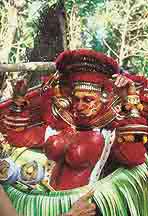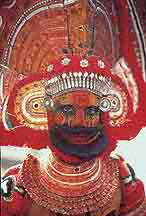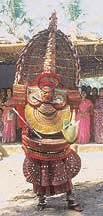- Home
- Archive -Feb 2000
- Starring God

Starring God
- In :
- Personal Growth
February 2000
By Pepita Shah
Donning a mask, wearing a deity’s robes, elevated to the realm of the gods, the mortal is moved by the spirit of divinity
 |
Malabar, the northern region of Kerala, India, is the home of Theyyam, an ancient 2,000-year-old performance-ritual whose basis is deceptively simple. The word is merely a corruption of daivam, meaning god. Yet, it encompasses a complex universe centered on the belief that a man can—after suitable mental, physical and spiritual preliminaries—don the costume of a particular deity and then become that deity. In this elevated state he assumes superhuman and divine powers—speaking, moving, blessing and even healing as a god or goddess. What is crucial is that the person is not possessed by the spirit of the deity. He is the deity and as one performer, Lakshmanan Peruvannan, explains, ‘is not considered to be present or to even exist’.
Although acquiring divinity can be seen as an extraordinary honor, Theyyam’s great irony is that its practitioners belong to one of the dozen or so communities at the bottom of Kerala’s complicated caste structure. In the not so distant past their presence, within a prescribed distance, was believed to be so polluting as to ritually contaminate high caste Hindus. Even now, though they are venerated and honored when ‘divine’, they still receive no special attention or recognition in their everyday lives.
 |
In fact, a key social aspect of Theyyam was, and sometimes still is, that it gave a voice to the downtrodden, and also an outlet through which, in trance, they could speak of the injustices inflicted on them by the higher castes. In trance the performer is divine, he is the supreme and absolute authority, what he says must be heeded to. Indeed endless stories recount the perils of ignoring a Theyyam’s dictates, of doubting his powers or withholding respect, stories replete with powerful instances of swift and divine retribution. Even today, when the negative connotations of being low caste have, by and large, been erased, devotees still display the humility of wary respect when approaching a Theyyam deity.
No one will be able to state categorically the number of deities. ‘Theyyam,’ it is said, ‘is divine and that which is divine can never be known or counted.’ But it is likely that there were once about 450 deities and half of those are still honored. Although many of them are now associated with aspects of deities familiar to Hindus throughout India, most have local and indigenous origins that reveal them as peculiar and particular to Malabar.
 |
The majority are fierce goddesses, divinities with unpredictable natures who can as easily nurture as destroy. This quality of latent, simmering rage characterizes many of the gods, several of whom are deified ancestors or long dead warriors whose charismatic lives were so charged that their spirits have transcended death. Inevitably in a culture, which exists so close to the apparently willful vagaries of nature, animals and snakes are worshipped as well as shadowy ghosts and spirits.
To talk of the concepts and history of Theyyam, the skills of its practitioners and the faith of its devotees is to state basic facts. Theyyam is to be experienced in the heat-charged day or night of a Malabar shrine, listening to pounding drums, as slowly and magnificently, an elaborately costumed and fantastically made-up other-worldly being approaches. At such moments doubts evaporate and one’s instinctive reaction is to fold one’s hands in the universal gesture of prayer and acknowledge one’s humility.
Text and photographs: Pepita Seth
Pepita Seth is a photographer, researching Kerala’s temple rituals.
To read more such articles on personal growth, inspirations and positivity, subscribe to our digital magazine at subscribe here
Life Positive follows a stringent review publishing mechanism. Every review received undergoes -
- 1. A mobile number and email ID verification check
- 2. Analysis by our seeker happiness team to double check for authenticity
- 3. Cross-checking, if required, by speaking to the seeker posting the review
Only after we're satisfied about the authenticity of a review is it allowed to go live on our website
Our award winning customer care team is available from 9 a.m to 9 p.m everyday
The Life Positive seal of trust implies:-
-
Standards guarantee:
All our healers and therapists undergo training and/or certification from authorized bodies before becoming professionals. They have a minimum professional experience of one year
-
Genuineness guarantee:
All our healers and therapists are genuinely passionate about doing service. They do their very best to help seekers (patients) live better lives.
-
Payment security:
All payments made to our healers are secure up to the point wherein if any session is paid for, it will be honoured dutifully and delivered promptly
-
Anonymity guarantee:
Every seekers (patients) details will always remain 100% confidential and will never be disclosed
